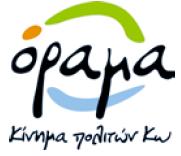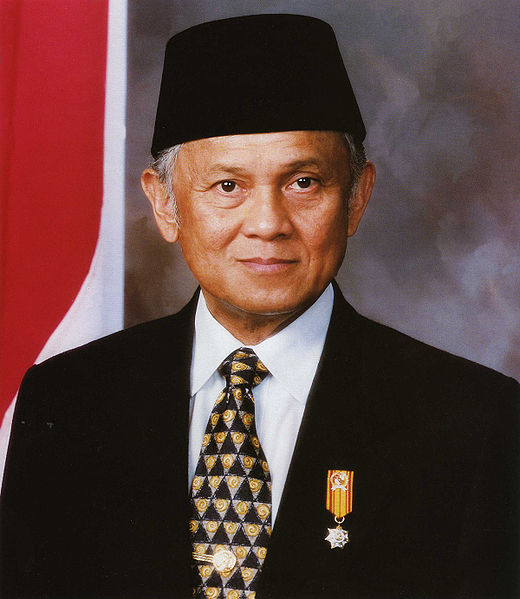<Back to Index>
- Philosopher Willard Van Orman Quine, 1908
- Architect Antoni Plàcid Guillem Gaudí i Cornet, 1852
- President of Indonesia Bacharuddin Jusuf Habibie, 1936


Bacharuddin Jusuf Habibie (born 25 June 1936), also known B.J. Habibie, was the third President of Indonesia, holding office from 1998 to 1999.
Bacharuddin Jusuf Habibie was born in Pare-Pare, South Sulawesi, to Alwi Abdul Jalil Habibie and R.A. Tuti Marini Puspowardojo. He studied at the Bandung Institute of Technology for
one year. Although B.J. Habibie himself was born in South Sulawesi,
B.J. Habibie's parents didn't come from this region. His father was an agriculturist from Gorontalo and his mother was a Javanese noble woman from Yogyakarta, who met when both of them were studying in Bogor. Habibie's father was a descendant of Bugis migrants to Gorontalo that were employed by local rulers as soldiers to protect Gorontalo's coast from Maguindanao pirates. In 1950, when Habibie was fourteen, he became acquainted with Lieutenant Colonel Suharto. The future Indonesian President was then stationed in Makassar to
put down a separatist rebellion and lived in a house across the road
from the Habibie family's. Suharto quickly became a family friend. He
was present during the death of Habibie's father and became an
intermediary when one of his soldiers wanted to marry Habibie's sister.
During 1955-1965, he studied aerospace engineering at the RWTH Aachen University, Germany,
receiving the Diploma in 1960 and doctorate in 1965.
He then worked for Messerschmitt-Bölkow-Blohm in Hamburg. It might have been due to this time spent in Europe that he became interested in the Leica line of cameras. While working in Messerschmitt-Bölkow-Blohm,
Habibie conducted many research assignments, producing theories on
thermodynamics, construction, and aerodynamics, known as the Habibie
Factor, Habibie Theorem, and Habibie Method.
In 1974, Suharto sent Ibnu Sutowo to
Germany to meet Habibie and convince him to come back to Indonesia.
Habibie was convinced and returned to Indonesia, taking the position of
Technological Adviser to the President. From 1978 to 1998 Habibie
served as Minister of Technology and Research in Suharto's Cabinet. He
pushed for a leapfrog strategy of development,
which he hoped would bypass the foundational low-skill technology
stages to turn Indonesia into an industrialized nation. Despite
national and international opposition (which preferred agricultural
investments to technological investments) to this; he once famously
announced that "I have some figures which compare the cost of one kilo
of airplane compared to one kilo of rice. One kilo of airplane costs
thirty thousand US dollars and one kilo of rice is seven cents. And if
you want to pay for your one kilo of high-tech products with a kilo of
rice, I don't think we have enough." Habibie
had considerable power as Minister of Technology. His long acquaintance
with Suharto combined with Suharto's own desire that Indonesia master
technology as part of its development meant that Habibie was able to
get extra funding from the budget for his projects at the expense of
other ministers' project. In 1989, Suharto increased Habibie's power,
putting him in charge of strategic industries. When Habibie came back to Indonesia in 1974, he was also made CEO of a new state owned enterprise called
PT. Nurtanio. By the early 1980s it had made considerable progress,
specializing in making helicopters and small passenger planes. In 1995,
Habibie succeeded in flying a N-250 (dubbed Gatotkoco) commuter plane.
He was assisted in his efforts by A.B. Wolff, former Chief of Staff of
the Dutch Airforce. In developing Indonesia's Aviation Industry,
Habibie adopted an approach called "Begin at the End and End at the
Beginning".
In this method, things such as basic research became the last things
that the workers at IPTN focused on while actual manufacturing of the
planes was placed as the first objective. In
1985, PT. Nurtanio changed its name to Indonesian Aviation Industry
(IPTN) and is now known as Indonesian Aerospace Inc. (Dirgantara).
By the late 80's, it became apparent that there was a rift between Suharto and his main political ally, ABRI.
Suharto, who had repressed Islamists in the earlier years of his regime
now began to make concilliatory gestures in a bid to build a new power
base to compensate the one he was losing with ABRI. In
December 1990, the ICMI was formed with Habibie as its Chairman. In
Suharto's eyes, ICMI would become his main weapon in appealing to the
Muslim society. ICMI was a successful venture, by 1994, it had 20,000
members including future political opponents such as Nurcolish Majid and Amien Rais. Habibie served as Chairman of ICMI for 10 years. Like all Government officials in Suharto's regime, Habibie was a member of Golkar. From 1993-1998, Habibie was a Daily Coordinator for the Chairman of the Executive Board.
The 1998 People's Consultative Assembly (MPR) General Session was to be held in the midst of the Asian Financial Crisis and many were hoping for Suharto to take serious steps to take the country out of trouble. In January 1998, after accepting nomination for a 7th term as President, Suharto announced the criteria for the person who he wanted as Vice President. Suharto did not mention Habibie by name but his suggestion that the next Vice President should have mastery over science and technology made it obvious who he wanted to nominate. The market reacted badly, causing the rupiah to further depreciate in value. Despite protests and former Minister Emil Salim trying to nominate himself as Vice President, Habibie was elected as Vice President in March 1998. By May 1998, the increasing poverty caused by the Financial Crisis and political discontent had reached boiling point. On 13 May, the shooting of six students at Trisakti University in Jakarta, caused extreme anger which in turn caused widespread riots and lootings. There were now explicit calls for Suharto to step down as President of Indonesia. Suharto responded by saying on 19 May 1998 that if he stepped down, the Vice President would become President and in a not too subtle jab to Habibie, said that he was not sure whether the Vice President could solve the problems facing the country. Habibie, who learned of Suharto's comments from television, was upset with his mentor and from then on was increasingly sympathetic to those who wanted Suharto to step down. While careful not to oppose him directly or support those who did, Habibie left the president in little doubt that he saw himself as Suharto's legitimate successor. Suharto, faced with dwindling civilian and military support, even among loyalists like Wiranto and Ginandjar Kartasasmita, decided to resign late on the evening of 20 May 1998. The next morning, on 21 May 1998, Suharto publicly announced his resignation and Habibie was immediately sworn in as President. There was mixed reaction to Habibie's assumption of the Presidency. Hardline reformists saw Habibie as an extension of Suharto's regime while moderate reformists saw him as leading a transitional Government.
With the release of his 2006 book, Detik-Detik Yang Menentukan: Jalan Panjang Indonesia Menuju Demokrasi (Decisive
Moments: Indonesia's Long Road Towards Democracy), there is speculation
that Suharto had wanted Habibie to resign along with him. In
Javanese style, Suharto hinted at this intention subtly. Habibie,
despite having Javanese root from his mother, didn't take the hint and
decided to take the office of the President. Because of this inability
to read his intentions, Suharto showed nothing but contempt and never
talked to Habibie again. Habibie's Cabinet, which was called the Development Reform Cabinet consisted mostly of the same faces which had served in Suharto's last Cabinet. To show his reformist bent, Habibie included United Development Party (PPP) member Hamzah Haz in the Cabinet. When he took office, Habibie made it clear that East Timorese Independence was out of the question, but that he would consider giving East Timor special autonomy. In January 1999, however, Habibie surprised everyone by announcing that a referendum,
choosing between special autonomy and independence, would be held in
East Timor. This particular decision made Habibie extremely unpopular
with ABRI. On
30 August 1999, the referendum was held and the East Timorese people
chose overwhelmingly for Independence. However, the retreat of
Indonesian troops from East Timor would not be peaceful as many were
killed by Pro-Indonesian para-militaries.
The
1998 MPR Special Session in November declared that an investigation
should be made into corruption charges especially that of Suharto's.
Habibie also thought of forming a special commission as a gesture of
good faith towards Reformasi and
invited noted lawyer Adnan Buyung Nasution to be on the commission.
Nasution would ask for a lot of power in investigating the matter and
Habibie rejected the offer. Instead, he appointed Attorney General and loyalist, Andi Muhammad Ghalib to head the investigation. On
9 December 1998, Suharto was questioned for three hours by Ghalib. The
Habibie Government declared that Suharto had not gained his wealth by
corruption. A
controversial tape was released which involved a telephone conversation
between Habibie and Ghalib. The conversation seemed to suggest that
Habibie's Government was not giving a serious attempt at investigating
Suharto's corruption charges. Habibie's
Government stabilized the economy after the chaos which it went through
in the Asian Financial Crisis and the last few months of Suharto's
Presidency.
Habibie's Government also began making concilliatory gestures towards Chinese Indonesians who because of their wealth and dominance of the Indonesian economy were targeted during the violence and looting. In September 1998, Habibie issued a Presidential Instruction which does not allow for the discriminatorial reference to pribumi (Native) and non-pribumi (Non-Native). In May 1999, Habibie followed this up with another Presidential Instruction which states that a display of ID Card is enough to prove someone's Indonesian citizenship whereas before, displaying the Letter of Evidence of Republic of Indonesia Citizenship (SBKRI) was the norm. Although they were not mentioned specifically, it is clear that these policies were targeted towards Chinese Indonesians who in the Suharto years were referred to as non-Pribumi and had to display SBKRI to prove their Indonesian citizenship.
When
he was a State Minister for Research and Technology, BJ Habibie created
a program called OFP (Overseas Fellowship program), SMDP (Science and
Manpower Development Program) and STAID (Science and Technology for
Industrial Development). The three programs were to provide
scholarships to thousands of students to continue their study for
master’s and doctorate program in the United States, Europe, Japan, and
others.
Although
he had been viewed as just leading a transitional Government, Habibie
seemed determined to continue as President. In May 1999, Golkar
announced that Habibie would be their Presidential candidate. At
the 1999 MPR General Session in October, Habibie delivered an
accountability speech, which was a report of what he had achieved
during his Presidency. Once this was completed, the MPR members began
voting to decide if they would accept or reject Habibie's speech.
During this process, pro-Reform members of Golkar broke with the ranks
and voted against Habibie and the accountability speech was rejected
with 355 votes to 322. Seeing that it would be unethical to go for the
Presidency after having his accountability speech rejected, Habibie
withdrew his nomination.
Since relinquishing the presidency, Habibie has spent more time in Germany than in Indonesia, however he has during Susilo Bambang Yudoyono's presidency been active both as a presidential adviser and through The Habibie Centre to ensure democratisation in Indonesia.